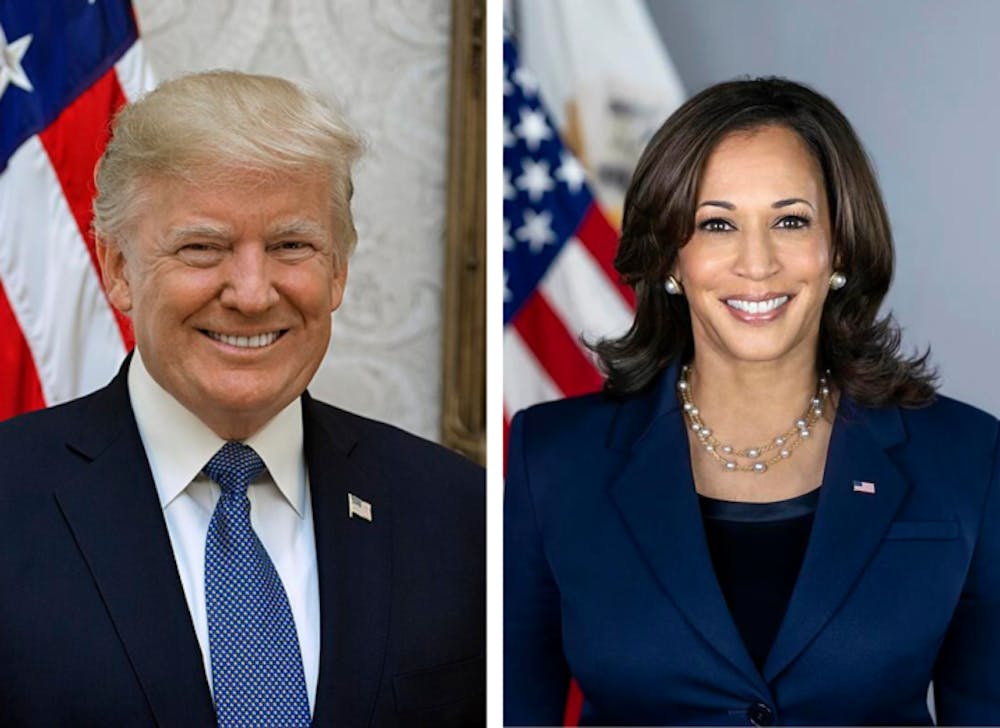Former U.S. President Donald Trump and Vice President Kamala Harris faced off Tuesday night in Philadelphia for their first and currently only scheduled debate. ABC News anchors David Muir and Linsey Davis moderated the debate, which covered topics such as abortion, immigration, the 2020 election, the Israel-Hamas war, Ukraine, Afghanistan, Harris’ race, Obamacare and the economy.
Associate Professor of Political Science Zachary Peskowitz said that the three key issues of this election are the economy, abortion rights and immigration.
Associate Professor of Political Science Bernard Fraga believes that voters are more likely to choose who they vote for based on the candidates’ perspectives about future issues rather than the candidates’ views on specific policies.
Since the U.S. Supreme Court overturned Roe v. Wade in 2022, abortion has become a key election issue for women voters, according to Peskowitz. He sees the issue of abortion as a winning issue for Democrats in the 2024 election.
“There are a lot of moderate voters and women voters who are quite troubled by the reversal of Roe versus Wade,” Peskowitz said.
According to a Pew Research Center poll from May, 63% of U.S. adults believed abortion should be legal in all or most cases, compared to 36% of U.S. adults who did not.
During the debate, Trump did not answer whether or not he would veto a national abortion ban if he were elected president. Harris maintained that the government should not interfere with a woman's ability to decide to have an abortion.
Peskowitz said that on the issue of immigration, Trump had a “natural advantage.” In 2021, U.S. President Joe Biden selected Harris to deal with immigration on the United States border with Mexico. Politicians such as Sen. Ted Cruz (R-Texas) have criticized Harris for her handling of the issue. According to Peskowitz, there is concern among moderate swing voters about the level of unauthorized immigration.
According to a recent Pew Research Center poll, immigration is the second most important issue for registered voters who are Trump supporters and the sixth most important among all registered voters.
In defense, Harris said that Trump rallied Republicans to vote against a deal on immigration that she hoped would help secure the southern border of the United States.
“Harris has to kind of go through this complicated explanation of, well, we had an agreement with conservative Republican members of Congress, and then Trump blew it up,” Peskowitz said.
Regarding the economy, Peskowitz said it was a “mixed bag” under the Biden administration. He mentioned there has been very high inflation under the administration but that unemployment is very low.
During the debate, Trump attempted to link Harris to Biden and his poor approval ratings on his handling of the economy. In response, Harris referenced some of Trump's economic proposals, which include his tariff proposals. Harris argued that Trump’s tariff plans would increase the cost of living.
“The interesting part of the back and forth, and that was a bit challenging for Harris, is Trump made this point that while [there were] tariffs on Chinese goods, the Biden administration has kept many of them in place even after Trump left office,” Peskowitz said.
Another issue that may sway moderate voters when deciding between Harris and Trump is Trump’s stance on the aftermath of the 2020 election, according to Peskowitz. During the debate, Trump denied that he had lost the 2020 election. Peskowitz believes that Trump talking about the 2020 election and defending the Jan. 6, 2021 insurrection is a winning issue for the Democrats.
“Clips of him … claiming that he won the 2020 election in this debate tonight and … sarcastic comments about just losing by a whisker,” Peskowitz said. “ I think that that's going to give some moderate swing voters pause about Trump.”
Additionally, during the debate, Harris called for an immediate return of the hostages held by Hamas in Gaza and an immediate ceasefire with an eventual path to a two-state solution between Palestine and Israel. Peskowitz said that in her answer, Harris was attempting to play a “balancing act.”
On platforms such as X, conservatives, including podcaster Ben Shapiro, Donald Trump Jr. and Sen. Lindsey Graham (R-S.C.), have called out Muir and Davis for not holding Harris and Trump to an equal standard when fact-checking, claiming that they insufficiently fact-checked Harris.
“The moderators might as well be on the DNC payroll. This is ridiculous,” Graham wrote on X.
Former CNN host Don Lemon praised the moderators for fact-checking Trump.
Peskowitz said that the moderators were “reasonable.”
“They've asked a broad set of questions, did a little bit of fact-checking, more on Trump … He made some claims that they argue were incorrect,” Peskowitz said. “I don't think that's going to dramatically sway anyone's interpretation of the candidates.”
Fraga said that coming into the night, Harris and Trump appeared virtually tied, with FiveThirtyEight interactives showing Harris just 2.7 points ahead entering the debate.
Peskowitz said that he thought last night's debate will not have a drastic outcome on the outcome of the 2024 presidential election.
“Both candidates kind of performed at the level that everyone expected,” Peskowitz said.

Spencer Friedland (26C) is from Long Island, N.Y. While not working at the Wheel, he is a member of Emory Disability Rights, Education Activism and Mentoring and the Franklin Fellows program. In his free time, he can be found watching the New York Yankees or going to the movies.






